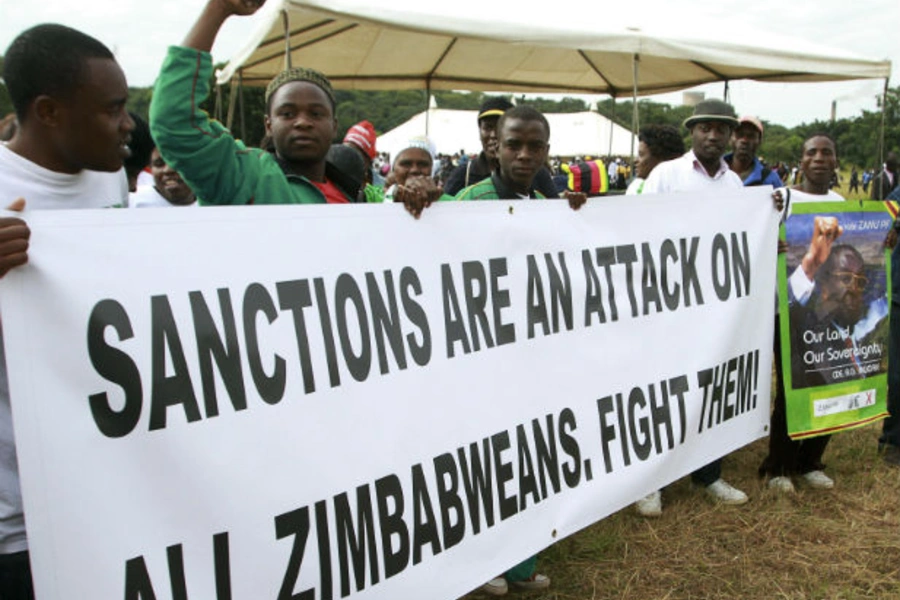
ZIMBABWE and its elite rulers have been reeling under sanctions imposed by the United States, Britain, European Union and its allies for over two decades.
The basis of the sanctions, according to the West, was to cajole the then Robert Mugabe led government to implement critical democratic reforms.
The West claimed that it was petrified by the flagrant human rights abuses and electoral fraud by the late Mugabe when he was still in power.
Once a darling of the West, the US and Britain sought to cripple Harare – through a harsh policy of isolationism aided by “smart sanctions”.
But Zimbabwe hit back. The rulers in Harare argued that sanctions were a reaction to the land reform programme of early 2000, which addressed historical imbalances and injustices.
However, two decades later, sanctions remain in place.
The Southern Africa Development Community (Sadc) and the African Union (AU) said the punitive measure must go because they are affecting the ordinary people. This was a welcome song to the Zanu PF government in Harare.
Sadc then set October 25 as an Anti-Sanctions Day. On Wednesday, civil servants led by permanent secretaries marched the streets of the capital in protest.
- CCC urged to push for dialogue over reforms
- A peep into Matenganyika’s artistic closets
- The Bioskop Short Film Competition is back
- Mangwe farmers benefit from agric projects
Keep Reading
The demonstrations, were in fact held in all 10 provinces. The AU, in a statement, said it stands with Sadc in calling for immediate and unconditional lifting of sanctions against some Zimbabwean institutions and individuals.
AU Commission chair Moussa Mahamat said he was gravely concerned about the negative effects of the sanctions on Zimbabwe’s socio-economic development.
Sadc also said the embargoes limit Zimbabwe’s economic growth.
Vice-President Constantino Chiwenga gave the figures. He said the economy has lost a jaw-dropping US$150 billion in the two decades.
“This has forced our GDP to contract drastically,” Chiwenga said when he addressed civil servants on Wednesday in Harare.
On the flip side, the West insist that there were human rights and electoral issues that must be addressed before sanctions are lifted.
This presents a stalemate because Harare says sanctions must go unconditionally while the West argues that certain issues need to be corrected.
So why not engage in meaningful dialogue for an amicable solution?
The government must do a self-introspection and be honest with itself when it comes to human rights.
Is it doing enough to protect its citizens? Are complaints of electoral irregularities wholly false or there is some outstanding issues which must be addressed?
Are allegations of “lawfare” against opposition politicians, such as Job Sikhala baseless?
I believe more needs to be done politically to nurture democracy and enhance tolerance. More needs to be done to cast away toxic politics because Zimbabwe is undoubtedly a damagingly divided nation.
Harare must just do the right thing by creating a conducive environment for Zimbabweans to enjoy civil liberties without fear of State security apparatus.
Again, Harare has to fully implement its re-engagement policy through dialogue with the West to remove the sanctions. We live in a global village and Zimbabwe needs partners in the US, Britain and the European Union.
While the anti-sanctions marches or demonstrations are good to show displeasure, it’s not enough to just protest on the streets without addressing fundamental matters that can make the sanctions to go.
Clearly, the sanctions will not go unconditionally, hence there is need for a compromise on both ends – Zimbabwe and the West.
To the Western governments, the ordinary people are suffering and this must be considered when reviewing the punitive measures.
There is an argument that the economic problems have little to do with sanctions but mismanagement and corruption, while this is true, we cannot ignore the effects of the Zimbabwe Democracy and Economic Recovery Act (Zidera) on the economy.
It has long been argued that the sanctions block Zimbabwe’s easy access to international markets, resulting in a sharp decline in foreign direct investment (FDI) and trade.
The punitive measures also affect the vulnerable groups of society such as children and women, as poverty levels are high affecting 49% of the population.
Therefore, the government must act in consciousness of how its actions have a ripple effect on innocent lives.











